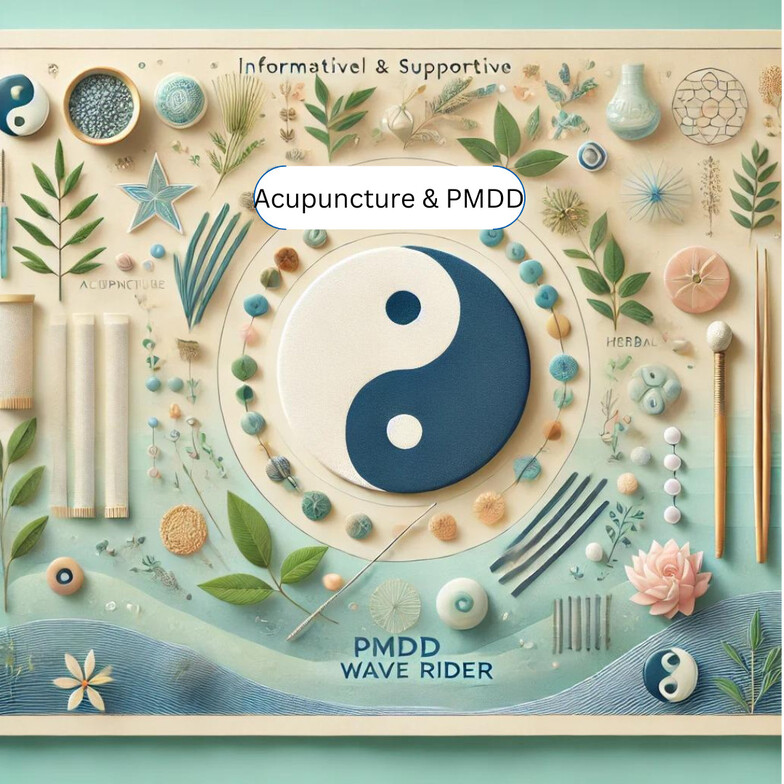
For those suffering from PMDD, a week each month can feel like a “write-off” or an “absolute dark night of the soul.” Hi! My name is Dr. Tanya Kelloway, and I am a Doctor of Acupuncture and Traditional Chinese Medicine Practitioner. With 14 years of experience, I’ve helped many people regulate their bodies and relieve PMDD symptoms. Today, I want to share this hope with you.
Empowering Your Health Journey
If you’re here, I assume you’re someone who takes their health into their own hands and likes to learn about things that can improve your life and health. I applaud your tenacity and desire to help yourself! In this article, I hope to share insights that may help you along your journey.
Centuries of Experience and Expertise: A TCM View of the Menstrual Cycle
Traditional Chinese Medicine (TCM), which has been around for over 5,000 years, offers a fantastic perspective on women’s health issues, including PMDD. As an acupuncturist, I use TCM’s holistic approach to look at PMDD symptoms. This helps me see those symptoms not as random or disruptive but as clues to help diagnose and treat your specific type of PMDD.
Jane’s Story: Treating PMDD with Acupuncture
Just last week, a patient I’ll call Jane (not her real name) came in after experiencing her first “hell week” (her term for PMDD week) since we started acupuncture treatments together. With teary, smiling eyes, she told me that for the first time in her 10-year menstrual history, she didn’t have a “hell week.” She felt in control of her behavior and emotions and embodied for the first time in her life. Jane couldn’t believe this could be her new reality.
Initially referred by her psychologist, Jane had doubts about acupuncture’s impact on her PMDD symptoms, but after our first month of working together, she saw hope for the first time. Jane saw me once a week for the three weeks leading up to “hell week” for acupuncture treatments. Our goal was to help shift her menstrual cycle and curb her PMDD symptoms.
Jane was really nervous (as many people are) when she received her first acupuncture treatment. It’s not uncommon to feel anxious before the first treatment, often imagining huge needles and a lot of pain. But I’m here to assure you, there’s nothing further from the truth. Jane quickly found out that acupuncture was not only pain-free but that she really enjoyed the feeling in her body during and after the treatment.
Often, when a person gets off the acupuncture table after their first visit, they feel extremely relaxed with a sense of peace and calm that washes over them. They often sleep well that night and feel more regulated the next day.
Understanding Your Menstrual Cycle
In my acupuncture practice, when I’m treating a menstruating female-bodied person, I always ask what phase of the cycle she is in. I wish tracking our cycles was something taught in school. The menstrual cycle is the closest thing we get to a monthly report card. Knowing your cycle can help you understand and manage your symptoms better.
Our menstrual cycle is 28 to 32 days on average when regulated. Day 1 of a menstrual cycle is the first day of your period. If you’re new to this information, I invite you to track the first day of your next period in your phone scheduler, on a physical calendar, or in an app like Wave Rider. This is your first step in learning about your body on a crucial level and will help you immensely in your health journey.
Why is Knowing Your Menstrual Cycle Important?
Understanding and tracking your menstrual cycle is crucial for several reasons. Firstly, when you keep track of your cycle and the symptoms you experience, you gain valuable insights into your body’s imbalances. This information becomes a powerful tool in understanding your health and is especially useful when working with a healthcare provider who has expertise in conditions like PMDD.
For example, experiencing intense abdominal cramps during your period is different from having them during your ovulation phase or post-period. Similarly, emotional upset after your period is distinct from feeling emotionally unbalanced before your period. Recognizing these patterns helps in accurately diagnosing and managing your symptoms. Awareness is the first step toward effectively managing your symptoms and improving your overall well being.
Acupuncture and Phases of Your Cycle
During each menstrual phase, acupuncture supports your body in different ways. There is a natural ebb and flow in your body to create your menstrual cycle. When your body is building up your uterine lining, acupuncture supports this function. When your body transitions its hormone panel to signal your uterus to “clean house,” this function is supported by a different acupuncture protocol.
On Day 1, the first day of a cycle, acupuncture helps the body “Move The Blood” to ensure the body effectively relieves this cycle’s blood so it can move into the next cycle all cleared out. Thinking of our menstrual cycle as resets, we can actualize changes in our reality by tapping into our body’s innate wisdom.
A Common Condition: PMDD and Liver Qi Stagnation
You might be familiar with the term Qi. In Traditional Chinese Medicine (TCM), Qi is considered the vital energy that flows through our bodies, similar to rivers flowing across the earth. This energy travels along pathways called meridians, which are like the intricate river systems of our body.
The Liver Meridian runs from our big toe, up the inner leg, through our internal and external genitalia, and ends under our chest. Given its pathway, it’s not surprising that this meridian plays a crucial role in the menstrual cycle.
In optimal health, our Qi flows freely through these meridians. As a Doctor of Acupuncture, I first look at the flow of Qi when assessing health. Qi Stagnation, particularly Liver Qi Stagnation, is a common imbalance in our modern lives.
The Liver is responsible for moving Qi through the meridians. Factors such as lack of movement, stress, alcohol, environmental toxins, and emotional disturbances can disrupt this flow. When Liver Qi becomes stagnant, it can significantly impact the menstrual cycle, contributing to conditions like PMDD.
If you are working with a Doctor of Acupuncture, they can help determine if Liver Qi Stagnation is affecting your PMDD. Here are a few lifestyle changes you can implement at home to help shift your Liver Qi and alleviate stagnation:
Dietary Adjustments:
- Eat regularly and at consistent times to maintain steady energy levels.
- Prefer warm, cooked meals over cold or raw foods to support digestion.
- Reduce caffeine and alcohol intake.
- Increase fiber by incorporating more vegetables, fruits, and whole grains.
- Avoid greasy and processed foods
Herbal Teas:
- Peppermint tea helps soothe the liver and improve Qi flow.
- Chamomile tea calms the mind and reduces stress.
- Dandelion root tea supports liver function and detoxification.
Acupressure:
- Apply gentle pressure to Liver 3 (Tai Chong), located on the top of the foot between the big toe and second toe, to help move stagnant liver Qi.
- Gallbladder 34 (Yang Ling Quan), located on the outer lower leg just below the knee, relieves tension and promotes the smooth flow of Qi.
- Pericardium 6 (Nei Guan), on the inner forearm above the wrist, helps with anxiety and emotional stress.
Exercise and Movement:
- Engage in moderate activities like walking, yoga, tai chi, or qigong to circulate Qi and relieve stagnation.
- Incorporate gentle stretching exercises to release tension and improve Qi flow.
Breathing Exercises:
- Practice deep, diaphragmatic breathing to relax and enhance Qi flow. Inhale deeply through the nose, allowing your abdomen to rise, and exhale slowly through the mouth.
- Focus on your breath for a few minutes each day to reduce stress and calm the mind.
Stress Management:
- Regular meditation practice can help reduce stress and promote emotional balance.
- Incorporate mindfulness practices into your daily routine to stay present and manage stress better.
Warm Compress:
- Apply a warm pack to your abdomen to relax the liver area and promote the smooth flow of Qi.
Hydration:
- Ensure you get enough restful sleep each night.
- Establish a daily routine that includes time for self-care, relaxation, and activities that bring you joy and reduce stress.
Lifestyle Changes
- Ensure you get enough restful sleep each night.
- Establish a daily routine that includes time for self-care, relaxation, and activities that bring you joy and reduce stress.
Creative Outlets
- Engage in creative activities like drawing, painting, playing music, or writing, which can help release emotions and relieve stress.
By incorporating these practices into your daily routine, you can help alleviate Liver Qi Stagnation and improve your overall well-being. Always consult with a TCM practitioner before starting any new treatments or making significant changes to your health regimen.
Understanding your body and its needs is the first step towards managing and alleviating symptoms of PMDD. Taking proactive steps can lead to a more balanced and harmonious life.
Embrace Your Journey
Remember, the journey to balance and well-being is unique for everyone. With dedication and the right support, you can manage your PMDD and lead a healthier, more harmonious life. If you or someone you know is struggling with PMDD, consider exploring the benefits of acupuncture and Traditional Chinese Medicine. You deserve a life free from PMDD’s disruptions, and we’re here to help you find that balance.

Tanya Kelloway
Contact Me




